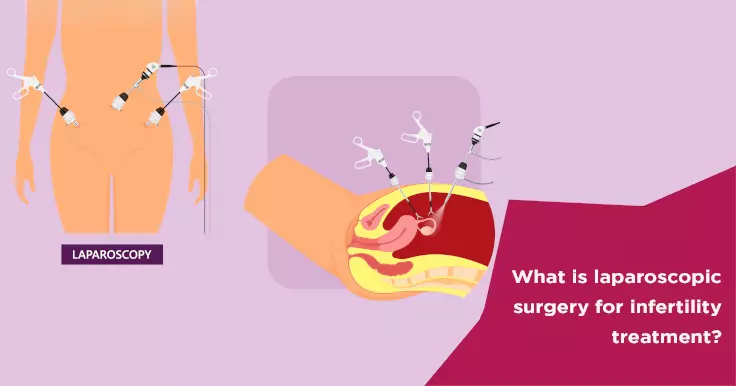Laparoscopic Surgery for Infertility Treatment: How It Works?

Women who are unable to conceive often go for an infertility treatment and laparoscopy is one method that may improve one's chances of getting pregnant. Laparoscopy is a minimally invasive type of surgery that is often used to diagnose or treat fertility issues.
The treatment is done under anaesthesia so the patient does not feel any pain. Two or three small incisions are made in the lower abdomen and a thin-long tube known as laparoscope is inserted. It has a camera and light fitted on it, which helps the surgeon have a look at the internal organs on the monitor outside.
When is Laparoscopy Recommended?
Following are some infertility issues for which laparoscopic surgery for infertility is recommended:
- PCOS or polycystic ovarian syndrome
- Fibroids blocking the fallopian tubes
- Ovarian cysts
- Endometrial deposits causing intense pain
Benefits of Laparoscopic Surgery for Infertility
It allows the doctor to have a comprehensive look at the organs inside the abdomen to identify various infertility issues. Besides diagnoses, laparoscopic surgery may be performed to treat some causes of infertility, thereby increasing the chances of conceiving. It also helps in removing endometrial deposits, scar tissues and fibroids.
Side-Effects of Surgery
Some commonly experienced complications are:
- Irritation of the skin at the incision site
- Bladder infection
- Adhesions
- Infection at the site of infection
- The occurrence of hematomas in the abdominal walls.
Less-common complications
- Severe allergic reaction
- Urine retention
- Severe damage to the blood vessels or abdominal organs
- The occurrence of blood clots
- Damage to the nerves
- Complications associated with general anaesthesia
Recovery Time
Since it is an outpatient procedure, the patient is discharged on the same day. If there are any complications involved, a hospital stay of 2-3 days may be advised. A couple of weeks are needed to completely recover from a Laparoscopic surgery. Proper medications will be prescribed to help speedy recovery and less pain. Patients should seek immediate medical help if they experience:
- A high fever of 101 or more
- Pus or intense pain at the site of the incision
- Severe abdominal pain and discomfort.
Can Laparoscopic Surgery Affect Pregnancy Chances?
Many women wonder if Laparoscopic surgery will affect their chances of pregnancy. But laparoscopy rarely fiddles with one's ability to conceive and usually causes no hindrance in getting pregnant. In fact, it may only increase the patient's chances of conception.
 Infertility Counselling
Infertility Counselling Female Infertility Treatment
Female Infertility Treatment Andrology Treatment
Andrology Treatment Fertility Enhancing Surgeries - Female
Fertility Enhancing Surgeries - Female Fertility Enhancing Surgeries - Male
Fertility Enhancing Surgeries - Male Endoscopy Treatment
Endoscopy Treatment IUI Treatment
IUI Treatment IVF Treatment
IVF Treatment ICSI Treatment
ICSI Treatment Advanced IVF Solutions
Advanced IVF Solutions Embryology
Embryology Vitrification Egg, Embryo, Sperm Freezing
Vitrification Egg, Embryo, Sperm Freezing Preimplantation Genetic Testing (PGT)
Preimplantation Genetic Testing (PGT) Donation Program Embryo / Egg / Sperm
Donation Program Embryo / Egg / Sperm Self-cycleTM IVF
Self-cycleTM IVF

 Self-cycleTM IVF
Self-cycleTM IVF










